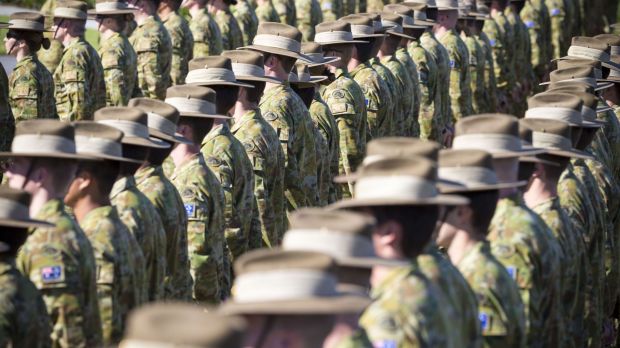The Coalition government could be heading for another bruising clash with Australia's military families over working conditions in the ADF with military advocates warning they will not accept cuts to entitlements in the new workplace deal.
The current "wage determination" for the nation's 57,000 men and women in uniform expires in November and with early stages of talks set to begin next week, the key defence families lobby group is warning its members will reject any further erosion of "conditions of service."

The Defence Force Welfare Association led an unprecedented backlash by tens of thousands of Defence families in late 2014 and early 2015 that forced the then-Abbott government into an embarrassing backdown in its stance on public sector pay and conditions.
In a submission to the Senate's Defence Committee, the association has warned its members, partners and families of sailors, soldiers and Air Force personnel who are banned from joining unions or any other form of industrial activity, will not tolerate their livelihoods going backwards in the new three-year pay deal.
The association said it also wanted changes to the working of the Defence Force Remuneration Tribunal body that sets the wages and conditions, whose role as an independent arbiter could "easily be thwarted" leaving pay decisions vulnerable to political pressure.
It is understood that advocates believe another pay rise offer of 2 per cent per year would be reasonable in the present climate of low inflation and wage growth, but there are rumblings that any attempt to impose Coalition industrial policy and insist pay rises be "offset by productivity gains", will lead to trouble in the ranks.
"We don't want a barney with anyone," one source close to the process told Fairfax.
"But if they try to lock us out again, there's gonna be a barney," he said, referring to the tribunal.
Coalition industrial policy - which does not cover the ADF - requires productivity increases to offset pay rises in workplace agreements with APS agencies.
However, ADF advocates say the policy is unworkable in the military, where improvements would be harder to measure.
Any pay offer meeting CPI growth or below should not require offsets from productivity growth, the DFWA told the Defence Committee.
"If the nation is prepared to continue to deploy its ADF, and is more than happy (judging by politicians' and public utterances) with its operational performance, then DFWA believes it should at least continue to pay its members (and maintain their conditions of service) at a stable rate, instead of reducing their relative income and conditions of service," it said.
Public Service Minister Michaelia Cash said specifics regarding the bargaining framework were yet to finalised.
The Defence Department did not respond to questions before deadline.